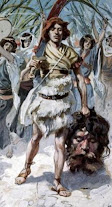What really happened to Saul? In chapters 10 & 11, the Spirit of the Lord came upon him. He prophesied, (1 Samuel 10:9-11); he acted decisively and courageously (1 Samuel 11:6-7). He was magnanimous in victory. (1 Samuel 11:13) But then he presumptuously offered the sacrifice Samuel was to offer, he made a rash vow that almost resulted in Jonathan's death, and he fell short of full obedience in victory over the Amelekites. Amalek is said to be symbolic of the flesh, a grandson of Esau, (Genesis 36:12), who despised the spiritual birthright, (Genesis 25:34, Hebrews 12:16). God vowed to utterly blot out the remembrance of Amalek from under heaven, Exodus 17:14, and called Saul to be the executor of this judgment. Sauls incomplete obedience is complete disobedience, and shows just how protective we are of the flesh, which we're to make no provision for (Romans 13:14). As 2 Peter 2:20 says, the latter end of someone entangled again and overcome by the flesh is worse than the ...





